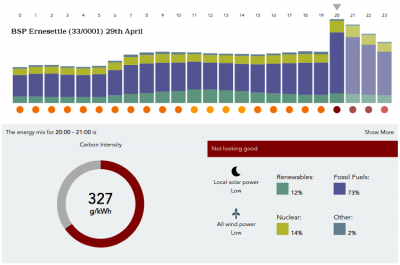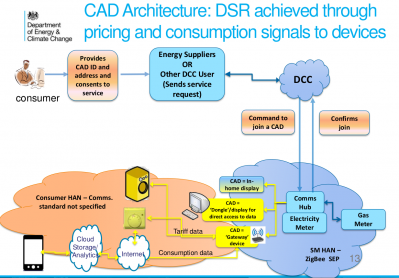Posted by: @heat-pump-newbie@derek-m It would be more relevant to saving co2 if the tariff was directly related to the mix of renewables at any given time, rather than the time of day.
I thought that most of the suppliers only provide 100% renewable energy, so how would your idea work? 😌
Posted by: @derek-mFor obvious reasons they cannot inform customers of their particular offset
I think I haven't explained the system sufficiently clearly.
Octopus cannot inform a customer of the meter time-offset because they don't know it themselves. There is no SMETS Command which enables a Smart Meter to reveal its offset from UTC.
If a command were sent to a domestic device, such as an EV charger, using the ALCS system, then the Comms Hub will automatically apply the offset. Thus a command to switch on the charger at 00:30 might actually be implemented at 00:24 for example.
But if Octopus send the same command using the internet, then the Comms Hub will be likely to apportion some part of that on-period to an 'incorrect' half-hour meter-register... and thereby introduce a billing error.
I do know how to work out the time offset of a Comms Hub. But I'd have to be present in your home to do so.
I'm also unsure whether it's wise to openly tell consumers how to do this calculation. I need to have a think about this. I don't want to reveal something which I later regret because it compromises some future technology!
Posted by: @heat-pump-newbieIt would be more relevant to saving co2 if the tariff was directly related to the mix of renewables at any given time, rather than the time of day.
True. Instead of relying on the REGO certificates being bought by the Energy Supplier, it would be better to genuinely move our usage to times when there is more renewable energy in the mix.
If you happen to live in a region where Western Power is the DNO, then you can manually do this by consulting the forecast mix on their Carbon Tracer site. Here's the Energy Mix for my area snapshot at just after 20:00 this evening
The statistics are probably within 2-3% of true accuracy. For example, OVO Energy has a Private Purchase Agreament (PPA) with Vattenfall, which is a massive wind-turbine farm in the North Sea. The intention is to bring the cables to the Norfolk coast. However, in the meantime, it's possible that OVO's contract may allow them to import electricity from Vattenfall's existing generation sites via the North Sea Interconnect. We can't know this because the contract is obviously commercially sensitive. But if the interconnect is used, then Western Power's statistical tools categorise this as 'Other' rather than 'Renewables'.
I have yet to find another DNO who publishes this as a live 'rolling forecast'. Others provide the statistics after the hour has passed.
Save energy... recycle electrons!
You did explain it clearly. My point was that whoever is controlling the offset, cannot divulge this information to Octopus or anyone else, otherwise all the EV and battery storage owners would apply the offset to switch on their EV charger or battery charger to align with the correct billing period. So in your example they would switch on at 00:36, rather than 00:30, which could possibly cause a surge in demand.
Thanks @derek-m but I'm still unsure that I've adequately clarified the system.
No one controls the offset. Each Comms Hub is implanted with a random number when it's manufactured. It cannot be changed.
If consumers knew the precise offset for their Comms Hub and used that to switch devices on/off, then there would be no surge.
Indeed, the whole point is that we should be switching devices to coincide with our particular time-offset. That's what ALCS is intended to ensure... but without us needing to know how it is achieved.
Save energy... recycle electrons!
Posted by: @transparentThanks @derek-m but I'm still unsure that I've adequately clarified the system.
No one controls the offset. Each Comms Hub is implanted with a random number when it's manufactured. It cannot be changed.
You can correct me if I am wrong, but I assume that in the proposed Smart Grid of the future where signals can be sent to switch on and off EV and battery chargers, along with heat pumps, refrigerators and freezers etc. during periods of high and low demand, the offset is designed to prevent everything being switched on and off at the same time (GMT or BST).
How do you think that the grid will cope when there are many more Octopus Go and the like customers, who actually program their devices to switch on using GMT or BST as it is at the moment. In that situation I don't think that the offset would be applied.
Yes @derek-m that's how the National Smart Meter Network was always intended to operate. It was designed back in 2013 during the coalition government, when Ed Davey was Secretary of State for Energy. I continue to be impressed at the foresight of the technical team he brought together to specify this Demand Side Response strategy.
It's lamentable that the main use of Smart Meters is now to feed usage data back to Energy Suppliers. They are meant to be the foundation block on which other technologies are built for the benefit of us end-users.
I don't know enough about how Octopus Go is managed. It would be understandable if @philiprsteele declined to reveal this to protect their IPR, although I'm sure we'd be very interested to know!
If Octopus' Kraken sends on/off commands to home-based devices using the internet, then they could send a matching command to their Billing Software to ensure that the customer really does get billed at the 'correct' rate for that usage. This effectively overrides the offset timings for meter data which are being being accrued within the Comms Hub registers.
That would allow Octopus themselves to implement correct bills, in keeping with their Ofgem licence.
However, such an approach would 'lock in' the customer to Octopus. The Kraken commands to that device couldn't be used by a rival Energy Supplier because they would have a different billing system.
I appreciate that Energy Suppliers may need to obtain monitoring data more frequently than the minimum 30-min period which is defined by the Smart Meter WAN.
However, I see no reason why commands from Kraken (or Kaluza's Flex) shouldn't be sent using ALCS, whilst feedback data is transmitted in the other direction using the internet. That would maintain the security of the UK energy delivery system.
Posted by: @derek-m...customers, who actually program their devices to switch on using GMT or BST
I don't see why this shouldn't continue as is.
If I use an App (or a future generation IHD with a touch-screen) to tell my EV charger to put 60% charge into the car by 07:00 GMT do I really care about the precise timings of when the charger is switched on/off via the ALCS controls?
Save energy... recycle electrons!
Posted by: @transparentIt is highly unlikely that some of these will ever be available with an ALCS-aware control interface. For example, the Energy specialists, Regen, have demonstrated that the cost of implementing ALCS is not financially viable for washing machines and dish washers.
Why would we need ALCS implemented in those appliances? We just need someone to give us easy ways of getting the ALCS signals from the smart meter to our smart home controllers (be it HomeAssistant, Hive or whatever) so that they can tell the smart plug for the washing machine (or whatever) to switch on.
It is sometimes necessary to look at the big picture.
If my understanding is correct, the objective of ALCS is to stagger the switching on of devices to prevent a grid overload.
For example, if 1 million washing machines with 2 kW heaters were all switched on at 00:30 thanks to Octopus Go, demand would be increased by 2 GW at a time when overall demand may be of the order of 20 GW. If you were then to add 1 million EV chargers at 7 kW and 1 million battery chargers at say 3 kW and 1 million immersion heaters at 3 kW, I don't think that it would be too long before all the lights went out.
You may not remember the days when everyone watched 'real' television and after something like the Miss World contest the grid had to be prepared for the surge in demand when everyone switched their kettle on at approximately the same time.
Not everyone has, or is likely to have, a smart home controller, but if sufficient people did and were aware of the ALCS offset applied in their area, then they could manipulate the timing of the switch on of their devices to align with the billing period, which would mean a great number of devices all switching on at approximately the same time.
To try to prevent a grid overload, particularly during the night when demand is lower, is it necessary to have a system that prevents everyone from switching on at the same time.
Posted by: @derek-m...
Not everyone has, or is likely to have, a smart home controller, but if sufficient people did and were aware of the ALCS offset applied in their area, then they could manipulate the timing of the switch on of their devices to align with the billing period, which would mean a great number of devices all switching on at approximately the same time.
To try to prevent a grid overload, particularly during the night when demand is lower, is it necessary to have a system that prevents everyone from switching on at the same time.
@derek-m, my only expertise in this is what I've read on this thread, so I could easily be mistaken. However, from what I understand from @Transparent's posts, the ALCS random offset is applied to each individual meter at time of manufacture, meaning there is no ALCS offset applied to any given geographical area.
I also believe that the random offset applied to a meter is used by that meter in its billing calculations, and that the information the electricity provider gets from the meter is accepted verbatim rather than trying to align with real time. In other words, if the meter reckons the time is 06:30 and Octopus reckons it's 06:35, and the start of peak billing is 07:00, an appliance in that house set to start at 06:30 meter time (06:35 Octopus time) and run for half an hour will be billed at 30 mins cheap rate ('cos it finishes at 07:00 meter time) and not 25 mins cheap/5 mins peak.
It's a fine detail, but the important point if I'm right is that anyone aware of the ALCS offset of their meter would manipulate the timing of their devices to align with the meter, not with the power company's published billing period, and so staggered switch-on would still be achieved. All the government seemed to be doing with the ALCS standard is to make that meter --> device alignment automatic.
@mjr, I agree that allowing a smart controller to get the offset from the meter so it can then control various devices accordingly would work fine. However, if the implementation of the offset on the meters has been done with such care as to avoid letting power companies interrogate it, I doubt we're going to see any changes any time soon that allow anything else interrogate it. The original vision, from what I understand from the thread so far, is for the smart meter to maintain control and delegating that control elsewhere would be a big change in direction.
105 m2 bungalow in South East England
Mitsubishi Ecodan 8.5 kW air source heat pump
18 x 360W solar panels
1 x 6 kW GroWatt battery and SPH5000 inverter
1 x Myenergi Zappi
1 x VW ID3
Raised beds for home-grown veg and chickens for eggs
"Semper in excretia; sumus solum profundum variat"
Posted by: @majordennisbloodnokmy only expertise in this is what I've read on this thread,
If you'd like to know more, then there's a rich repository of published material in Ofgem's archives, such as this Presentation by Tim Bailey. He was one of the architects of Demand Side Response.
Most of what I'm stating here is derived from these official publications. They give useful insights into an array of features within Smart Meters which the Energy Suppliers haven't (yet) tapped into.
For example, there's a concept called a Block Tariff. This gets superimposed on top of a Time of Use tariff which has already divided price-points across the 48 half-hour time intervals of the day. The Block Tariff allows the Supplier to preset a usage level, after which the cost changes.
So if I wish to recharge my EV during a low-cost period 01:00 to 05:30, I might be able to draw 10kWh at one price, but the remaining proportion at a higher/lower price.
Here's another example. A Block Tariff is being applied for 3 hours during the early evening peak-demand period. Usage of more than 4kWh between 5-8pm is charged at a 5p/kWh premium.
Such a mechanism would favour those in Energy Poverty. 4kWh is sufficient to keep a heat-pump operating and cook the family meal. But wealthier households would find themselves paying extra if the children come home from school, throw their clothes in the wash and switch on PCs for a couple of hours of online gaming!
In this time of increasing energy poverty, I am dismayed that the Energy Suppliers seem to understand too little of the tools at their disposal to alleviate the burdon on the most vulnerable members of the population.
What they lack is a knowledgeable 'Consumer Panel' to challenge them on ethics and advise them how we would respond to proposed flexi-tariff variations.
I hope this is read by @philiprsteele and forwarded to senior management within Octopus. As a company, they are in a prime position to offer such variations because they're starting from an existing ToU tariff, which has provided them with useful data on customer responses.
Save energy... recycle electrons!
Posted by: @majordennisbloodnokif I'm right is that anyone aware of the ALCS offset of their meter would manipulate the timing of their devices to align with the meter, not with the power company's published billing period
It is a fine detail... but alas, you've jumped to the wrong conclusion. 😟
The internal offset timing within our Smart Meter Comms Hubs is precisely the same as the billing periods used by the energy suppliers.
It must be so because the only consumption data which is available to our Suppliers is the record held in the Comms Hub registers. They have no idea of the precise time when we used that amount of energy.
Save energy... recycle electrons!
Posted by: @mjrWe just need someone to give us easy ways of getting the ALCS signals from the smart meter to our smart home controllers (be it HomeAssistant, Hive or whatever)
Well I'm glad to see some adventurous thinking @mjr
Let's keep the discussion going and see where this leads.
Firstly there are only five ALCS channels available from each domestic Smart Meter. They need to be deployed carefully. I think the public would be furious if they got 'leased out' to the major Tech-companies of the world for use within their own proprietary 'smart products'.
Five channels is sufficient to make a really serious impact on CO2 emissions, increased use of renewables and combating energy poverty. We dare not fritter it away on expensive non-critical technology which enables us to turn off lights with our voices and turn up the central heating whilst we're on the drive home from the office.
Secondly the existing Smart Meter system already has four concepts for implementing these ALCS switches in the home
- direct connection to the electricity meter's internal relay, as is used for storage radiators on Economy-7
- ALCS control embedded within a consumer device such as tumble-drier or EV charger
- A Consumer Access Device (CAD) which can operate multiple devices connected to it (similar concept to a Smart-plug)
- A Smart-energy Hub
The last three categories receive signals from the Communications Hub via the existing Home Area Network (HAN) using the Zigbee protocols.
A CAD is likely to have an inbuilt calendar, preset by the householder. It either has its own touchscreen or picks up 'event data' from an enhanced version of an IHD.
It is not possible to pair a device with your Comms Hub unless your Energy Supplier authorises it. It requires a 'live dialogue' to achieve this.
An ALCS command can only be issued via your Energy Supplier because it must transit through the encrypted processes of DCC.
Save energy... recycle electrons!
- 26 Forums
- 2,342 Topics
- 53 K Posts
- 536 Online
- 6,000 Members
Join Us!
Worth Watching
Latest Posts
-
RE: Configuring third party dongle for Ecodan local control
@majordennisbloodnok I think the HPDHD diagnosis may be...
By Sheriff Fatman , 15 minutes ago
-
RE: Are We Sleepwalking Into Another Race to the Bottom?
@editor how about a video "ChatGPT vs average heating e...
By ksim , 24 minutes ago
-

RE: External pipework insulation
I don't think we can tell from a photo whether your exi...
By Transparent , 39 minutes ago
-
-
RE: Controlling Daikin Altherma via P1P2 and Home Assistant
@majordennisbloodnok That’s correct. I can’t find anywh...
By weoleyric , 7 hours ago
-
RE: Octopus Cosy Heat Pump Owners & Discussion Thread
@andrewj yeah we recreated it. Engineer seemed to think...
By swwils , 8 hours ago
-

RE: Setback savings - fact or fiction?
@robs — thanks again for your detailed comments. Some r...
By cathodeRay , 1 day ago
-

RE: A Smarter Smart Controller from Homely?
@papahuhu I hope you get a swift resolution. Regards, T...
By Toodles , 1 day ago
-

RE: Poll for Time of Use, tariffs, technology
That’s fine by me too Major, I feel it is a sad reflect...
By Toodles , 1 day ago
-

Bingo. Sometimes a judiciously placed size 10 bovver bo...
By Majordennisbloodnok , 1 day ago
-
RE: Mitsubishi Ecodan 11.2kW heat pump with low COP
@ciocoiu-alexandru I can't provide the same level of di...
By Sheriff Fatman , 1 day ago
-

The three technical issues I'm considering are: BMS...
By Transparent , 1 day ago
-
RE: LiFePO4 lithium battery fires and explosions
@transparent Your post may fit better in th...
By Batpred , 1 day ago
-

RE: British Gas vs Octopus Energy vs Heat Geek vs EDF vs Aira vs OVO vs EON.Next vs Boxt
@jamespawhite, if you could be bothered, you could also...
By Mars , 1 day ago
-
RE: Commencing on an ASHP Installation Process
I've got a bit of time to draft something today, so the...
By Sheriff Fatman , 2 days ago
-
RE: Help with heat pump sizing
@amin I dont think materially relative to t...
By JamesPa , 2 days ago
-

@majordennisbloodnok I have decided to take the plunge....
By TechnoGeek , 2 days ago
-
RE: Different dT on each radiator?
I cant sorry. Its based on some calculations I did fro...
By JamesPa , 3 days ago








